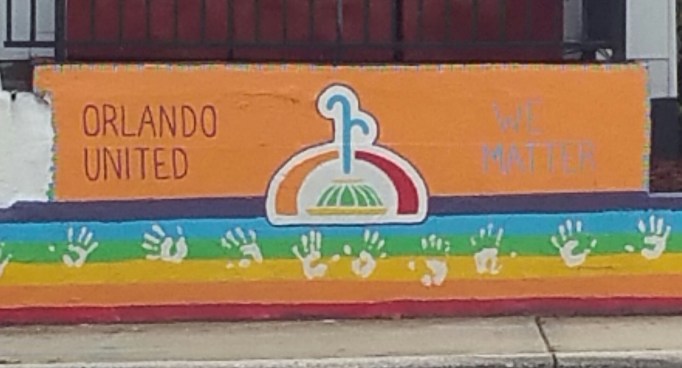It — That Day — snuck up on me this year. Granted, I’ve had a lot on my mind the last month:

My New Granddaughter and Her Teal-Wearing Grandma (family photo, Teresa TL Bruce, TealAshes.com)
- Waiting for the birth of my first grandchild in another state
- Helping my daughter recover from the birth of her daughter
- Rushing home to prepare my house for Hurricane Irma’s attack on my state
- Cleaning up after Irma smacked Florida up one side, across the middle, and up the other side as well
- Juggling the usual stuff — editing, writing, paying bills, tending to family needs …

Some residents displayed humor in the aftermath of massive cleanup following Hurricane Irma. In worse-hit areas, there’s not much to laugh about as residents try to reassemble their lives. (photo by Teresa TL Bruce, TealAshes.com)
So it makes sense that I felt distracted while attempting to work last week. I missed my precious baby granddaughter (and her parents) while I dealt with Irma issues. Even so, I’m usually better able to tune out distractions while polishing prose — whether my clients’ or my own.
As that long, long week drew to an end, realization hit me. All at once, I understood what kept my attention blowing aside, why my mind felt muddled, where the eye of my inner storm hit a wall:
In a handful of days I would complete my seventh year as a widow. I once again faced the anniversary of my husband’s unexpected death.
Odd and disrespectful as it sounds to admit this, I laughed when I recognized how few days remained before this year’s deathiversary. (Yes, I know that sounds awful!)
But I couldn’t help it. In fact, I felt almost giddy. (That sounds even worse, doesn’t it?)
That the date snuck up on me felt like a victory of sorts. This year, I’d finally functioned (reasonably well) through the early days of September. Mild distraction — easily attributed to gratitude and gladness over becoming a grandmother as well as the harried hurry of hurricane hassles — proved a gazillion times better than the overarching, insurmountable, emotional maelstroms of previous Septembers.
I remember the acute pain of new, raw grief: Loss hollowed my gut and battered my brain. Sleep channeled nightmares instead of rest, and waking meant the worst nightmare was real. Simple, familiar tasks required impossible concentration and dexterity. Memory melted. I couldn’t eat. Couldn’t think. Didn’t want to exist.
People tried to rush me through the grief. “Don’t worry. You’ll feel better in time.” But in that new grief I didn’t need to be told my life-changing loss didn’t matter. The best consolation came from those whose honesty acknowledged my life would never be the same. I needed to hear that the devastation I felt made sense.
But I also heard hope — hope I couldn’t yet believe but needed anyway — from other widows (and widowers) who’d lost their spouses longer ago than I had. I felt validated when they said things like, “It’s okay that you’re falling apart” — and I really had fallen apart at the time — “because this is the worst thing that could have happened.”
Or they’d caution me by saying, “Sometimes it might feel even worse than it does right now, but it won’t always feel this bad.”
Then I asked the naive question only someone desperate not to feel so awful will plead: How long? How long will this grief tear me up? How long until I feel like myself again?
Their experienced, widowed answers varied, but they ran along similar, appalling, prophetic lines: Three years. Five years. Seven years.
It seemed impossible to survive with grief’s ache for three hours at at time, much less three years. But their frankness assured me it was okay that I didn’t “bounce back” right away (despite other folks’ well-meaning, ill-informed attempts to urge me to “get over” my mourning).
Time and experience certified their counsel as reliable. Starting over takes time — emotionally, physically, financially, socially — and learning to live onward after the death of a loved one requires starting over. At my husband’s three- and five-year angelversaries, I knew I still had a long way to go, but I could see how much progress I’d also made.
Now, heading into the completion of year seven and the beginning of year eight, I more than see that progress — I feel it.
No doubt there will be setbacks. Life and love and grief are built that way.
And I might yet want need to dive into a carton of Publix Chocolate Trinity on the day before and the day of his death, if any of the local stores have started receiving ice cream in their post-Irma shipments again, that is. (See Grief Meltdown in the Ice Cream Aisle for more about this yummy flavor.)
But today … today I’m feeling fine. And that’s a good sign.
I laughed again while I typed the lines just above. In the background, I heard this song by The Piano Guys with Sir Cliff Richard. A few years ago, maybe even last year, I wouldn’t have believed the words these great artists sang. Back then, I couldn’t, but now, I do believe “It’s Gonna Be Okay.”







